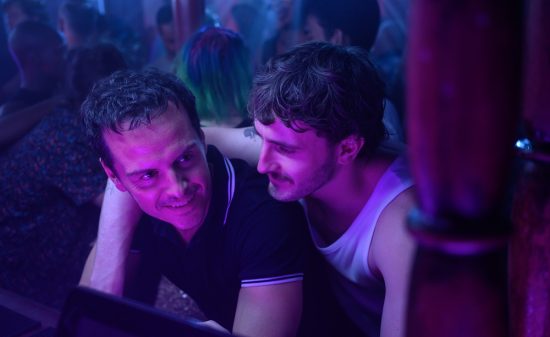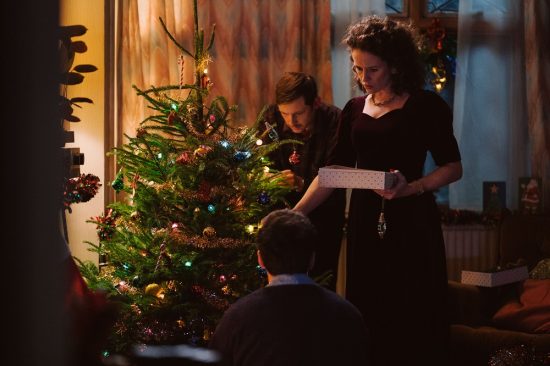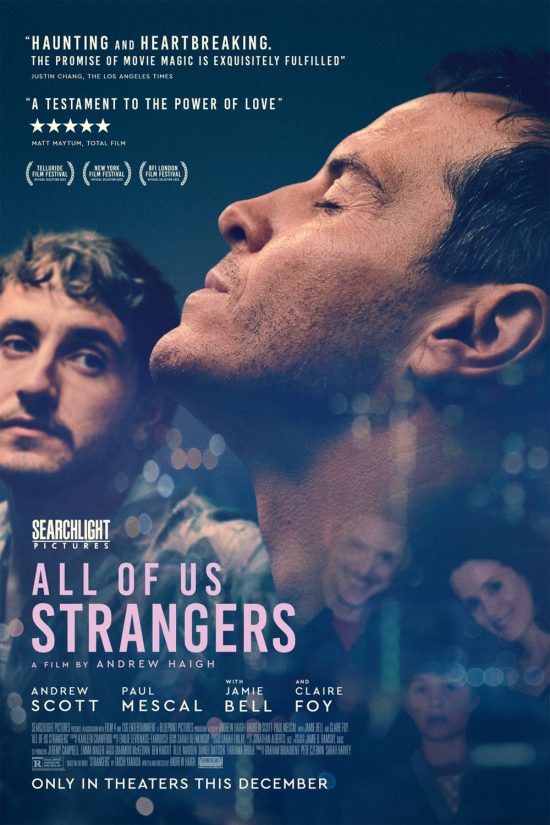LFF 2023 Review: All Of Us Strangers – “A beautifully tender supernatural romantic drama.”

Andrew Scott and Paul Mescal in ALL OF US STRANGERS. Photo by Parisa Taghizadeh, Courtesy of Searchlight Pictures. © 2023 20th Century Studios All Rights Reserved.
Past and present live side by side in Andrew Haigh’s beautifully tender supernatural romantic drama. The film is based on the 1987 book Strangers by Yamada Taichi, with the story shifted from Tokyo to (mostly) present-day London and given a gay protagonist. Forty-something screenwriter Adam (Andrew Scott) is creatively blocked, and possibly depressed. He’s struggling to write a script inspired by his relationship with his parents who died in a car crash when he was 12.
In an opening montage, we see Adam going through the motions with his work, napping on the couch, eating leftover takeout, watching daytime TV and looking at old childhood photos as if searching for clues, playing Frankie Goes To Hollywood’s The Power of Love on the turntable. Adam also seems to be one of the only residents in a new-build high-rise, establishing shots show a Ballardian-esque building jutting into the London skyline. But he isn’t quite alone. He’s spotted a young man a few floors down. Soon Harry (Paul Mescal), is knocking on the door, Japanese whisky in hand, asking if he can come in. Adam is reticent at first, and says no. But soon he’s ready to open the door to this handsome stranger.
Just as the presence of love cut short hung heavy over the couple in his earlier film, 45 years — the weight of his parents’ absence and the things left unsaid has haunted Adam for a long time. In lesser hands, a supernatural plot about grief could have been cheesy. But Haigh introduces it subtly, reminiscent of Céline Sciamma’s Petite Maman. When he meets his deceased parents, it feels more like a gentle time-hop, where they’ve waited for him just a suburban train ride away, after Adam has gone there for inspiration.
In a park, Adam spots another moustachioed stranger looking over at him. With a simple head nod, he summons him over, but this isn’t what you might think. The man is his dad, who buys some booze and cigarettes and tells him they’re going home. Adam seems curious rather than anxious, perhaps looking for confirmation of his identity. When he realises it’s his dad, he just goes with it, and the pair go head home.
All four central performances are superb. Mescal is disarming and vulnerable as Harry, and the chemistry between the two actors is undeniable. Scott is measured, emotions bubbling under the surface, occasionally letting Harry in with a soft smile. But sitting in his childhood kitchen, Adam can feel the anger of his 12-year-old self searching to be understood by a mother who is literally from a different time. Claire Foy and Jamie Bell are excellent too, Foy is permed and softly spoken, trying to understand herself as much as her grown-up son. Bell is stoic and frank and admits he struggled to know how to comfort his Adam when he was bullied as a kid. The family dynamics are pitch-perfect, particularly during a Christmas-time scene.

Jamie Bell and Claire Foy in ALL OF US STRANGERS. Photo by Chris Harris. Courtesy of Searchlight Pictures. © 2023 20th Century Studios All Rights Reserved.
Generational differences in attitudes towards sexuality are explored throughout the film. Adam’s dad casually quips about things getting too “poofy”, and his mum worries about “that terrible disease”. Adam tries to reassure his mum who died during the height of the AIDS crisis that things have changed. But there are differences between Adam and his new love interest too. Harry is far too young to have lived through the terrifying tombstone advert or section 28 that are seared into Adam’s memory. They quip back and forth about whether queer or gay sounds better, and Adam admits most of his friends have left for the suburbs and he hasn’t had a partner in a while.
All of Us Strangers is a beautifully crafted film too. Jonathan Alberts’ editing holds just the right amount of space for the more emotional beats to land. Sarah Findlay’s production perfectly reimagines Adam’s childhood Croydon home in all its 1980s glory — replete with floral wallpaper and brown interiors. The film has a hyperreal, almost magic-realist quality, Haigh has said he wanted the film to exist in a liminal space and Jamie D. Ramsay’s cinematography renders this perfectly. Adam and Harry’s budding relationship exists in a mostly nocturnal bubble, bathed in gorgeous deep blues.
The music choices are spot on too. Eighties pop classics including the Pet Shop Boys stir up nostalgia, while a ketamine-fuelled night out plunges Adam deeper into his existential crisis, as he wanders through a club to the crunching and droning sound of Blur’s Death of the Party.
But it’s the performances that take something supernatural and make it incredibly human and emotional. The film’s coda goes in for a sucker punch that may leave some reeling. It worked for me, cementing the film’s central themes of the importance of connection, holding on, and letting love in, however briefly.










